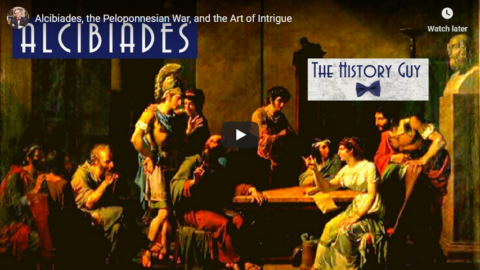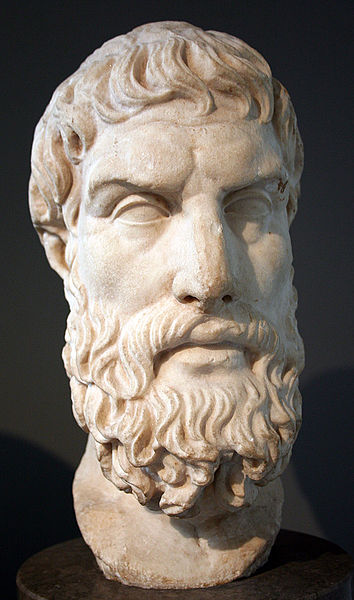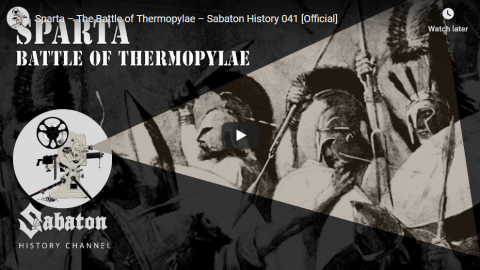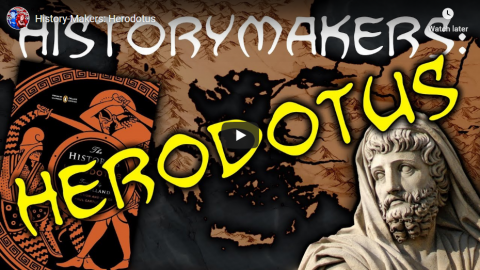The History Guy: History Deserves to Be Remembered
Published 27 Dec 2019Intrigue has always been a part of both diplomacy and war. In ancient Greece, one enterprising politician and general took the art of switching sides to the extreme. The History Guy remembers Alcibiades, a general who had an out-sized effect on the Peloponnesian War.
This is original content based on research by The History Guy. Images in the Public Domain are carefully selected and provide illustration. As images of actual events are sometimes not available, images of similar objects and events are used for illustration.
All events are portrayed in historical context and for educational purposes. No images or content are primarily intended to shock and disgust. Those who do not learn from history are doomed to repeat it. Non censuram.
Find The History Guy at:
Patreon: https://www.patreon.com/TheHistoryGuy
The History Guy: History Deserves to Be Remembered is the place to find short snippets of forgotten history from five to fifteen minutes long. If you like history too, this is the channel for you.
Awesome The History Guy merchandise is available at:
teespring.com/stores/the-history-guyScript by JCG
#history #thehistoryguy #ancienthistory
August 17, 2020
Alcibiades, the Peloponnesian War, and the Art of Intrigue
April 19, 2020
QotD: Early Greek philosophers
The greatest name in this succession of first researchers was that of Democritus, who became known as the laughing philosopher. In his ethical teaching great store was set by cheerfulness.
Democritus was still living when the new scientific movement suffered a violent reverse. It was in Athens, a center of conservatism, that the opposition arose and it was brilliantly headed. The leader was no other than Socrates, who despaired of the possibility of scientific knowledge. Even Aristotle, who pioneered in some branches of science, rejected the atomic theory. Between these two great names came that of Plato, who believed the ultimate realities to be not atoms but triangles, cubes, spheres and the like. By a kind of analogy he extended this doctrine to the realm of abstract thought. If, for example, perfect spheres exist, why should not perfect justice exist also? Convinced that such perfect justice did exist, he sought in his own way to find it. The ten books of his Republic record only part of his searchings of the mind. At the core of all this thinking lies the doctrine that the eternal, unchangeable things are forms, shapes, models, patterns, or, what means the same thing in Greek, “ideas.” All visible things are but changing copies of unchanging forms.
The Epicurean Revival
After the great triumvirate of Socrates, Plato and Aristotle had passed away the scientific tradition was revived with timely amendments by Epicurus. In his time it was the prevalent teaching that the qualities of compound bodies must be explained by the qualities of the ingredients. If the compound body was cold, then it must contain the cold element air, if moist, water, if dry, earth, and if hot, fire. Even Aristotle sanctioned this belief in the four elements. Epicurus, on the contrary, maintained that colorless atoms could produce a compound of any color according to the circumstances of their combination. This was the first definite recognition of what we now know as chemical change.
The Stoic Reaction
Epicurus was still a young man when Athenian conservatism bred a second reaction to the new science. This was headed by Zeno, the founder of Stoicism. His followers welcomed a regression more extreme than that of Aristotle in respect to the prime elements. For the source of their physical theories they went back to Heracleitus, who believed that the sole element was fire. This was not a return to the Stone Age but it was a longish way in that direction.
This Heracleitus had been a doleful and eccentric individual and became known, in contrast to the cheerful Democritus, as the weeping philosopher. His gloom was perpetuated in Stoicism, a cheerless creed, of which the founder is described as “the sour and scowling Zeno.” Epicurus, on the contrary, urged his disciples to “wear a smile while they practiced their philosophy.”
Running parallel to these contrasting attitudes toward life and physical theories was an equally unbroken social divergence. Platonism as a creed was always aristocratic and in favor in royal courts. “I prefer to agree with Plato and be wrong than to agree with those Epicureans and be right,” wrote Cicero, and this snobbish attitude was not peculiar to him. Close to Platonism in point of social ranking stood Stoicism, which steadily extolled virtue, logic, and divine providence. This specious front was no less acceptable to hypocrites than to saints. Aptly the poet Horace, describing a pair of high-born hypocrites, mentions “Stoic tracts strewn among the silken cushions.” Epicureanism, on the contrary, offered no bait to the silk-cushion trade. It eschewed all social distinction. The advice of the founder was to have only so much regard for public opinion as to avoid unfriendly criticism for either sordidness or luxury. This was no fit creed for the socially or politically ambitious.
Norman W. DeWitt, “Epicurus: Philosophy for the Millions”, The Classical Journal, 1947-01.
February 8, 2020
300 | Based on a True Story
The Cynical Historian
Published 29 Jul 2015Here is another episode of “Based on a True Story”. This time it is 300 and how it is based on the battle of Thermopylae. It is a great film with a great many historically innacurate plot points.
————————————————————
references:
http://www.todayifoundout.com/index.p…http://www.historyvshollywood.com/ree…
https://en.wikipedia.org/wiki/300_(fi…
————————————————————LET’S CONNECT: https://twitter.com/Cynical_History
————————————————————
Wiki:
300 is a 2006 American epic fantasy war film based on the 1998 comic series of the same name by Frank Miller and Lynn Varley. Both are fictionalized retellings of the Battle of Thermopylae within the Persian Wars. The film was directed by Zack Snyder, while Miller served as executive producer and consultant. It was filmed mostly with a super-imposition chroma key technique, to help replicate the imagery of the original comic book.The plot revolves around King Leonidas (Gerard Butler), who leads 300 Spartans into battle against the Persian “god-King” Xerxes (Rodrigo Santoro) and his invading army of more than 300,000 soldiers. As the battle rages, Queen Gorgo (Lena Headey) attempts to rally support in Sparta for her husband. The story is framed by a voice-over narrative by the Spartan soldier Dilios (David Wenham). Through this narrative technique, various fantastical creatures are introduced, placing 300 within the genre of historical fantasy. The events are revealed to be a story told by Delios, the only one of the 300 Spartans to survive the battle.
300 was released in both conventional and IMAX theaters in the United States on March 9, 2007, and on DVD, Blu-ray Disc, and HD DVD on July 31, 2007. The film received mixed reviews, receiving acclaim for its original visuals and style, but criticism for favoring visuals over characterization and its depiction of the ancient Persians in Iran, a characterization which some had deemed racist; however, the film was a box office success, grossing over $450 million, with the film’s opening being the 24th largest in box office history at the time. A sequel, entitled Rise of an Empire, which is based on Miller’s unpublished graphic novel prequel Xerxes, was released on March 7, 2014.
————————————————————
Hashtags: #history #300 #Thermopylae #review #BasedOnATrueStory #Sparta #ThisIsSparta
January 7, 2020
History Summarized: Alcibiades
Overly Sarcastic Productions
Published 11 Jan 2016The oracle at delphi simply tells him, “congratulations”. The standard of nudity was his idea. Narcissus gets shy around him. Patroclus was his boyfriend first. He is … the most interesting man in Ancient Greece.
Extra special thanks to Blue’s professor, Mr. Samons, who taught him about Greek history and the comedic potential of marshmallows and triremes.
November 25, 2019
How to Be an Epicurean
In City Journal, Michael Gibson reviews a recent book on Epicureanism by Catherine Wilson:
The Atomic Age had its anxieties, but Hugh Hefner believed he had a good diversion. “We aren’t a family magazine,” he announced in the first issue of Playboy in 1953. “We enjoy mixing up cocktails, an hors d’oeuvres or two, putting a little mood music on the phonograph, and inviting in a female acquaintance for a quiet discussion on Picasso, Nietzsche, jazz, sex.” By the 1960s, the music had grown louder, the colors more lurid, the conversations steamier. When Hefner died in 2017, he was considered either a hero of hedonism or an object lesson in the period’s squalid obsessions. Run a Google search today on Hefner, and you’ll often find the word “Epicurean” to describe him. Is this fair to Epicurus, the man who set forth the philosophy starting in 306 BC?
Marble bust of Epicurus. Roman copy of Greek original, 3rd century BC/2nd century BC. On display in the British Museum, London.
Photo by ChrisO via Wikimedia Commons.For 23 centuries now, Epicureans have struggled mightily against variations of the Hefner caricature. If pleasure is the highest good, the goal of the best life, must we all strive to live in pajamas, smoking a pipe in a decadent Hollywood Hills estate? Though he didn’t live in a mansion off Sunset Boulevard, at the end of the fourth century BC, at the age of 32, the philosopher Epicurus founded the Garden, a school removed from Athens’s monuments of power and politics. An inscription at the entrance read: “Stranger, here you will do well to stay; here our highest good is pleasure.” (In Chicago, Hefner’s door bore an inscription: Si Non Oscillas, Noli Tintinnare, or “If you don’t swing, don’t ring.”)
Leading life in a modern Garden is the subject of Catherine Wilson’s latest book, How to Be an Epicurean: The Ancient Art of Living Well. There was always an air of Peter Pan-like anarchy at the Playboy Mansion, but as Wilson shows us, life in the Garden was quite different. Her book is a spirited tour and defense of Epicurean philosophy, as reconstructed by the fragments Epicurus left behind in tattered papyrus and as set forth in the epic poem De Rerum Natura, “On the Nature of Things,” by the Roman poet Lucretius.
What did these pleasure-seekers believe? They start with the elementary particles, atoms — tiny, colorless, without smell, shaped this way and that, indestructible, reshuffling themselves infinitely into all the marvelous forms we see, including ourselves. Their forms get swept away by time, only to recombine again into something new — possibly another universe. Blurred in this haze of metaphysics, most atoms fall straight downward into the void, but a few swerve, and from these deviations arise our free will and all that we see. At the California Institute of Technology, physicist Richard Feynman began his lectures by wondering what single sentence would be passed on to future generations, if, in a cataclysm, all scientific knowledge was destroyed. His answer: “The atomic hypothesis that all things are made of atoms.”
With the Epicureans, we have a historical test of Feynman’s thought. The world is made of nothing more than atoms in the void, but where did that take the ancient Greeks and Romans who believed it? Wilson begins with these basic building blocks because she asserts that mistaken beliefs about nature are the source of our deepest fears and hang-ups: death, punishment in an afterlife, failure in this one, lust for power, greed, jealousy, unrequited love, and status-jockeying. “Epicurean philosophy might be said to be based on the notion of the limit,” Wilson writes. By understanding the atom and the void, by knowing that the soul is mortal and the gods indifferent, that all things pass and are forgotten, we might then liberate ourselves from the grinding weight of superstition and the vanity of ambition and pursue pleasure without guilt.
November 15, 2019
“Sparta” – The Battle of Thermopylae – Sabaton History 041 [Official]
Sabaton History
Published 14 Nov 2019The Battle of Thermopylae of 480 BCE may be one of the most famous battles in Ancient History. King Leonidas and his 300 Spartans were certainly not as alone in their last stand against the Persians, but are nevertheless remembered as being an underdog who would rather die than lose their freedom.
Support Sabaton History on Patreon: https://www.patreon.com/sabatonhistory
Listen to The Last Stand (where “Sparta” is featured):
CD: http://bit.ly/TheLastStandStore
Spotify: http://bit.ly/TheLastStandSpotify
Apple Music: http://bit.ly/TheLastStandItunes
iTunes: http://bit.ly/TheLastStandItunes
Amazon: http://bit.ly/TheLastStandAmz
Google Play: http://bit.ly/TheLastStandGooglePlayWatch the official lyric video of “Sparta” here: https://www.youtube.com/watch?v=hm-PT…
Listen to Sabaton on Spotify: http://smarturl.it/SabatonSpotify
Official Sabaton Merchandise Shop: http://bit.ly/SabatonOfficialShopHosted by: Indy Neidell
Written by: Markus Linke and Indy Neidell
Directed by: Astrid Deinhard and Wieke Kapteijns
Produced by: Pär Sundström, Astrid Deinhard and Spartacus Olsson
Creative Producer: Joram Appel
Executive Producers: Pär Sundström, Joakim Broden, Tomas Sunmo, Indy Neidell, Astrid Deinhard, and Spartacus Olsson
Post-Production Director: Wieke Kapteijns
Maps by: Eastory
Edited by: Iryna Dulka
Sound Editing by: Marek KaminskiEastory YouTube Channel: https://www.youtube.com/channel/UCEly…
Archive by: Reuters/Screenocean https://www.screenocean.com
Music by Sabaton.Sources:
– Photo of Persian warriors relief by Jakub Hałun from Wikimedia Commons
– Xerxes I by Mbmrock from Wikimedia Commons
– Bayerische State Painting Collections
– RijksmuseumAn OnLion Entertainment GmbH and Raging Beaver Publishing AB co-Production.
© Raging Beaver Publishing AB, 2019 – all rights reserved.
September 16, 2019
History-Makers: Herodotus
Overly Sarcastic Productions
Published on 13 Sep 2019Signup for your Free trial to The Great Courses Plus here: http://ow.ly/diiG30oC0Lk
There is much to do, and many unknowns on our horizon! — One of those unknowns is “How did Herodotus become the Father of History” and why is his book so confusingly organized? All that and more on this installment of History-Makers!
Let me know which History writer you’d like me to discuss next in the comments below!
PATREON: https://www.Patreon.com/OSP
DISCORD: https://discord.gg/sS5K4R3
MERCH LINKS: https://www.redbubble.com/people/OSPY…
OUR WEBSITE: https://www.OverlySarcasticProductions.com
Find us on Twitter https://www.Twitter.com/OSPYouTube
Find us on Reddit https://www.Reddit.com/r/OSP/— — —
The Great Courses Plus is currently available to watch through a web browser to almost anyone in the world and optimized for the US, UK and Australian market. The Great Courses Plus is currently working to both optimize the product globally and accept credit card payments globally.
February 20, 2019
History Summarized: Ancient Greece
Overly Sarcastic Productions
Published on 26 Jun 2017What’s that? Blue already did a video on the Athenian empire? Uh… well… um… LOOK, OVER THERE, A DISTRACTION!
For more Greek goodness, check out the following:
History Summarized: Alcibiades: https://youtu.be/kRLkjBUgB2o
History Summarized: Thebes: https://youtu.be/L1x9np5fys8
History Summarized: Athenian Empire: https://youtu.be/cNWDkFkcuP4This video was produced with assistance from the Boston University Undergraduate Research Opportunities Program.
PATREON: http://www.patreon.com/user?u=4664797
Find us on Twitter @OSPYouTube!
January 22, 2019
QotD: From Athenian democracy to the Magna Carta
It is always tempting to look for our roots in ancient Athens … tempting, but wrong. The ancient Athenian “democracy” in the agora was, to be charitable, just mob rule, and the mob was incited, most often bought and paid for, by a series of loud mouthed bullies and celebrities ~ so, I can hear some of you saying, not much different from Canada and the USA in the 21st century, right? Now and again, Thucydides, for example, the loud mouth bully also had some brains and good ideas, but, more often than not they were just unqualified pretty boys and clowns.
The Romans gave us something a wee, tiny bit better: rule by law. But the Romans are, rightfully, often best remembered as engineers and they “engineered”, rigged, their political system to ensure that while there were, indeed, laws, to protect and serve the interests of the common people, the plebeians, the system ensured that no law could stand if it ever threatened the privileges of the patricians ~ Rome’s equivalent of our Laurentian elites.
The first time we find something that I think we can properly claim as a “root” of our, modern, liberal democracy is in Anglo Saxon England where, somewhat haphazardly to be sure, a council, called the Witan, advised and constrained and sometimes even elected the monarch for about 400 years, until the Norman conquest. The Witan (members of the Witenaġemot ~ the “meeting of wise men”) were the first privy council, the prototype of modern, Australian, British and Canadian cabinet government.
Next, in Norman times, came Magna Carta, echoes of which can still be heard in our great common law. Magna Carta itself was not as important as two men who, in their turn, gave it life. King John had no difficulty in persuading the Pope to disallow Magna Carta but the British barons actually went into open revolt and, first, William Marshal, acting as Earl Marshal of England and regent for the boy King Henry III, traded Magna Carta for an independent exchequer, and then Simon de Montfort, acting for the barons against the grown King Henry III, forced Magna Carta and parliamentary supremacy on to England.
Ted Campbell, “Our Conservative Roots”, Ted Campbell’s Point of View, 2017-03-05.
December 12, 2018
Why Socrates Hated Democracy
The School of Life
Published on 28 Nov 2016We’re used to thinking hugely well of democracy. But interestingly, one of the wisest people who ever lived, Socrates, had deep suspicions of it.
October 27, 2018
Last Spartans: the survival of Laconic Greek
NativLang
Published on 27 Jan 2017The story of a Greek town that I’m told still preserves the Spartan tongue. I explore why they don’t speak like the rest of Greece and dig into their connection to ancient Sparta. Will their Tsakonian language survive?
Thanks to Vlogbrothers for their sponsorship of this video.
~ CORRECTIONS & ADDITIONS ~
The man from Leonidio is a “headmaster”, not “schoolmaster”. His story and links to the recordings are in my sources doc below.
“hoplos researched” should read “hoplon researched” / “aspis researched” – my thanks to @Roelkonijn
~ SUMMARY ~
Ancient Greece was home to a variety of dialects. Athens and Sparta both put up a major fight. Long story short, the dialect of one of those cities won out. Guess which? Athens, of course. Attic Greek combined with a hefty dose of Ionic to form the Koiné (Common) Greek, the ancestor of basically all modern Greek dialects.
All but perhaps one. Travel to a small town in the south of Greece, where a headmaster leads his students up the hillsides to record the words of their elders. These aging villagers speak Tsakonian (Τσακώνικα), a special remnant that may soon crumble into another Greek artifact.
I look at pieces of the grammar and pronunciation of the language, and show you what sets it apart from Modern Greek. Search for any ancient holdouts it preserves. Consider its connection to the Doric dialect of Ancient Sparta. Finally, ponder its place in modern Greece and how much longer it will be with us.
September 28, 2018
The Death of Socrates
Andrew Heaton
Published on 17 Feb 2017A 100% historically accurate, clinical portrayal of the Death of Socrates.
July 15, 2018
Alcibiades, the Athenian Byron
Not for poetry, but for the Byronian swathe he cut through a large portion of Classical Greece:
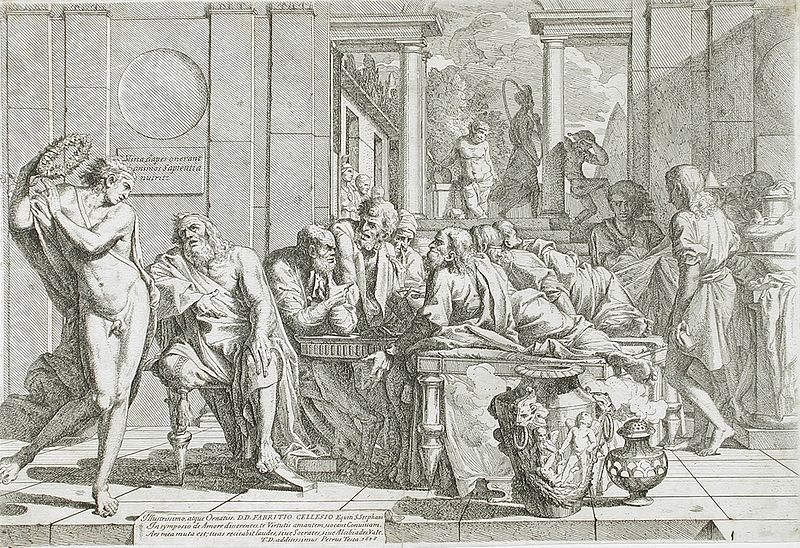
“Drunken Alcibiades interrupting the Symposium”, an engraving from 1648 by Pietro Testa (1611-1650)
Via Wikimedia Commons.
Of all personality traits, charisma is the hardest to appreciate at second hand. We read Cicero’s letters and can instantly tell that he was vain, insecure and ferociously clever; we read scraps of Samuel Johnson’s conversation in Boswell’s biography and know at once that he was magnificent, lovable and desperately unhappy. But as to what it was like to have Lord Byron turn the full force of his attention onto you – well, we have no conceivable way of knowing. We just have to trust his contemporaries that it felt like ‘the opening of the gate of heaven’.
This causes problems for a biographer of Alcibiades. On the face of it, the man was utterly insufferable. Born in around 450 BC into one of the oldest and richest families of ancient Athens, Alcibiades was the only Old Etonian (as it were) to play a leading role in the late-fifth-century radical democracy. The account of his childhood in Plutarch’s Life of Alcibiades suggests a bad case of antisocial personality disorder: biting during wrestling, mutilating dogs, punching his future father-in-law in the face for a dare. His later political career makes Boris Johnson seem like a man of firm and unbending principle. Exiled from Athens in 415 BC over some particularly odious Bullingdon Club antics, Alcibiades promptly sold his services to Sparta (where he seduced the king’s wife) before double-crossing both sides and wheedling his way into the court of a Persian satrap.
But Alcibiades, like Byron, clearly had that indefinable something. One catches a glimpse of it in the unforgettable last scene of Plato’s Symposium, when he crashes into the room, blind drunk, flirting with everything on legs, shouting about his love for Socrates. Thucydides captures it in his report of Alcibiades’s speech whipping up the Athenian assembly to vote for the disastrous Sicilian expedition of 415 BC – an extraordinary stew of egotistic bragging (about how successful his racehorses are), mendacious demagoguery and brilliantly acute strategic thinking. The unwashed Athenian masses, not usually prone to atavistic toff-grovelling, absolutely adored him: when Alcibiades finally returned to Athens in 407 BC after eight years of exile, sailing coolly into Piraeus on a ship with purple sails, they welcomed him back with paroxysms of joy.
Behind the Peloponnese-sized ego, Alcibiades was a general of spectacular genius – when he could be bothered. In 410 BC, shortly after his controversial reinstatement as admiral of the Athenian navy (on the back of a bogus promise of Persian support), he wiped out the entire Spartan fleet at the Battle of Cyzicus; two years later, through sheer chutzpah, he captured the city of Selymbria near Byzantium with only fifty soldiers, and without striking a blow. When things went wrong – as in 406 BC, after a disastrous campaigning season in the eastern Aegean – he showed an infuriating ability to wriggle out of trouble. His final years (406–404 BC) were spent once again in exile from Athens, holed up in a private castle on the Gallipoli peninsula. The circumstances of his death are still shrouded in mystery. One story tells that he died in the remote mountains of central Turkey at the hands of the brothers of a Phrygian noblewoman whom he had decided to seduce. This is, I fear, all too believable.
This is the introduction to a review by Peter Thonemann of a new biography of Alcibiades by David Stuttard in the Literary Review for July, 2018. H/T to Never Yet Melted for the link.
June 9, 2018
Thermopylae – The Hellenic Alliance – Extra History – #1
Extra Credits
Published on 7 Jun 2018A small handful of Grecian city-states have come together to stand off against the invading Persians at Thermopylae. At this fateful mountain pass, Greece will discover its identity as a nation.
The Battle of Thermopylae is one of the most significant events in the ancient world — and also one of the least understood.
Brought to you by Total War: Arena! Use the code HOPLITE for extra goodies:
https://totalwararena.net/join/4064_EN1…
March 25, 2018
The appearance of wealth
Victor Davis Hanson on how the wealthy once were eager to appear as distinct from the common herd as possible:
Even in the mostly egalitarian city-states of relatively poor classical Greece, the wealthy were readily identifiable. A man of privilege was easy to spot by his remarkable possession of a horse, the fine quality of his tunic, or by his mastery of Greek syntax and vocabulary.
An anonymous and irascible Athenian author — dubbed “The Old Oligarch” by the nineteenth-century British classicist Gilbert Murray — wrote a bitter diatribe known as “The Constitution of the Athenians.” The harangue, composed in the late fifth century B.C., blasted the liberal politics and culture of Athens. The grouchy elitist complained that poor people in Athens don’t get out of the way of rich people. He was angry that only in radically democratic imperial Athens was it hard to calibrate a man by his mere appearance: “You would often hit an Athenian citizen by mistake on the assumption that he was a slave. For the people there are no better dressed than the slaves and metics, nor are they any more handsome.”
The Old Oligarch’s essay reveals an ancient truth about privilege and status. Throughout history, the elite in most of the Western world were easy to distinguish. Visible class distinctions characterized ancient Rome, Renaissance Florence, the Paris of the nineteenth century, and the major cities of twentieth century America.
A variety of recent social trends and revolutionary economic breakthroughs have blurred the line separating the elite from the masses.
First, the cultural revolution of the 1960s made it cool for everyone to dress sloppily and to talk with slang and profanity. Levis, T-shirts, and sneakers became the hip American uniform, a way of superficially equalizing the unequal. Contrived informality radiated the veneer of class solidarity. Multimillionaires like Bruce Springsteen and Bono appear indistinguishable from welders on the street.
The locus classicus is perhaps Facebook owner Mark Zuckerberg, who wears T-shirts, jeans, and flip flops to work. His reported wealth of $71 billion makes him the world’s fifth-richest man. The median net worth of Americans is about $45,000. Zuckerberg is worth more than the collective wealth of about 1.5 million Americans — or about all the household wealth in Philadelphia put together. And yet, he looks perfectly ordinary. When I walk the Stanford campus — where many of the world’s wealthiest send their children — the son of a Silicon Valley billionaire looks no different from a machinist’s daughter on full support from Akron.
Second, technology has done its part to dilute superficial class distinctions. The nineteenth-century gap between a rich man in his fine carriage — with footman and driver — and someone walking three miles to work has disappeared. The driving experience between a $20,000 Kia bought on credit with $1,000 down and a $80,0000 Mercedes paid in cash is mostly reduced to the superficial logo on the hood and trunk. An alien from Mars could not easily distinguish, at least by sight, between the two cars. Even after a ten-minute ride, an alien might be puzzled: What exactly did that extra $60,000 buy?

